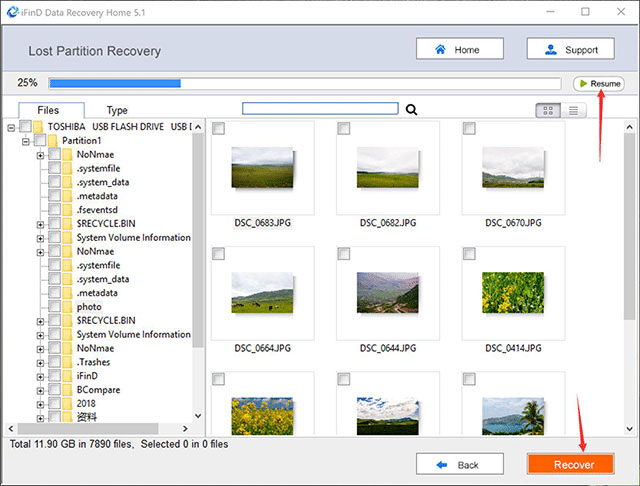Flash drive is the most popular portable devices we use every day, both for live and work. it’s easy to carry, can store huge photos, documents, and other files. Even better, it goes with Larger capacity and cheaper price these days. Nevertheless, there is also a huge risk of lose data from your flash drive. Luckily, iFinD can offer you a Free Flash Drive Recovery solution.
Introduction of Flash Memory.

Flash memory combines the characteristics of ROM and RAM. On the one hand, it has the performance of EEPROM, and cannot lose data when power is cut off. On the other hand, it has the performance of NVRAM to read data quickly. USB flash disk and MP3 are all used for this kind of memory. In the past 20 years, embedded systems have been using ROM as storage devices, but now Flash has completely replaced ROM (EPROM).
At present, the main Flash on the market includes NOR Flash and NAND Flash. The NOR Flash was launched by Intel in 1988, and the NAND Flash was launched by Toshiba in 1989. The advantage of NOR Flash is that it has a faster read speed and can provide Execute in place (XIP). The drawback is that writing operations and cleaning operations take longer time, and lower capacity, higher prices. So it’s typically used in phones, BIOS chips and embedded systems for code storage.
NAND Flash reads slowly, but writes and erases faster than NOR Flash, in addition, has a large capacity and low price. Therefore, NAND Flash is mostly used for data storage in digital cameras, MP3 players, USB disks and laptops.
Comparison of Flash Drive and RAM, Disk.
Flash memory compensates for the shortcomings of RAM and disk in terms of price, access delay, transmission bandwidth, density, and energy consumption. Compared with other memory, Flash memory has the following advantages:
- Compared with the disk containing mechanical components, the read and write delay of Flash memory is lower.
- Energy consumption is significantly lower than RAM and HDD.
- Stable read and write performance, random read and write and sequential read and write performance are consistent.
- High reliability, MTBF is one order of magnitude higher than disk.
- Flash Drive can adapt to the harsh environment, including high temperature and severe vibration.
The status of Flash memory in the new storage architecture
- It replaces or partially replaces memory as reading cache or pre-read log of disk storage system, and as a persistent storage system.
- In the notebook area, FlashSSD completely replaces disk has become a reality.
- Samsung and Microsoft jointly launched a hybrid hard disk with built-in Flash chip, which can greatly improve the performance of hard disk. provide faster start-up and recovery speed, reduce energy consumption, and provide longer endurance for notebooks.
What are the Main Reasons for Flash Drive Data Loss?
There are many reasons for the data lost, some of which are complex, but they can be grouped into the following categories:
- The flash drive was suddenly pulled out when reading and writing. This damage to Flash Drive is the most lethal and is likely to cause permanent damage to the flash drive. We should try to avoid this situation when we use the flash drive.
- When the flash drive is reading or writing, the computer suddenly loses power or the operating system runs out and restarts, which will also cause data loss and serious permanent damage to the flash drive.
- Because of the unstable voltage, the flash drive failed to write when copying files.
- Infecting viruses or malicious programs further destroys or removes data from flash drive.
How to Recover Data from Flash Drive Use the iFinD Data Recovery?
Step1: Formatting the device, You will get a normal partition when you finish it, but there are no data in it, temporary.
Step2: Download and install the latest version of iFinD Data Recovery.
Step3: Select the first feature, “Lost File Recovery,” and select the USB flash drive you need to restore.

Step4: Select the file you need to restore, and then click “save” to save it on the local device.

Notice: Do not save files on an external hard drive that is being restored. The wrong operation will cause permanent damage to the data, and then, cannot be recovered.
You can also read the tip for How to Recover Deleted Files from USB Flash Drive for more details and guide.
Through the above article, we know what is the flash drive, the reasons about the data loss of flash drive, and how to use the professional data recovery software iFinD Data Recovery to recover the lost data on a flash drive.

Andy is an editor of the iFinD Team. She worked in this big family since her graduation. Her articles mainly focus on data backup and recovery, disk cloning, and file syncing, committed to resolving the data loss issues users may encounter on their PCs. Besides, more related computer articles are shared here.

